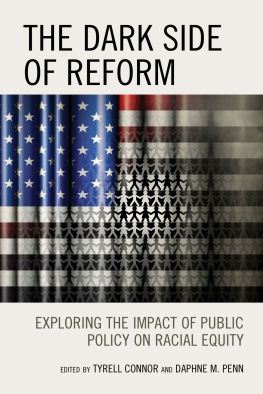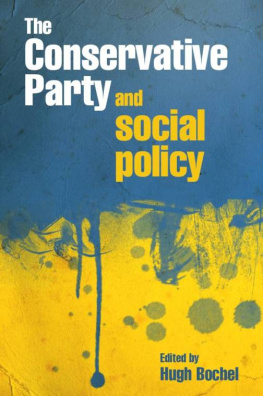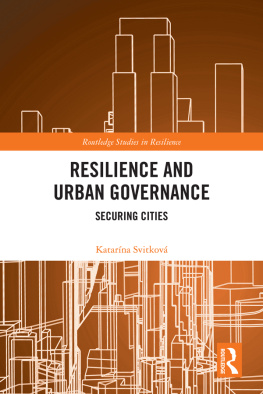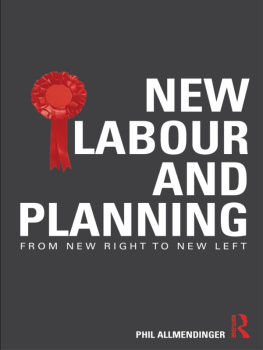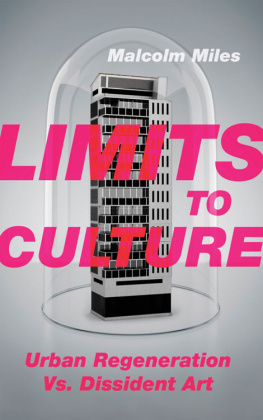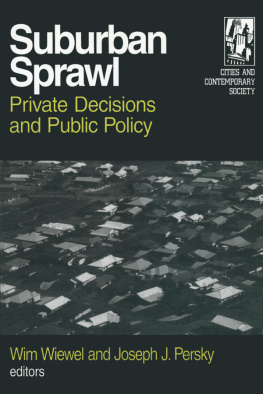
Deprivation, State Interventions and Urban Communities in Britain, 196879
Focusing on a series of policy initiatives from the late 1960s through to the end of the 1970s, this book looks at how successive governments tried to address growing concerns about urban deprivation across Britain. It provides unique insights into policy and governance and into the socio-economic and cultural causes and consequences of poverty.
Starting with the impact of redevelopment policies, immigration and the rise of the inner city, this book examines the pressures and challenges that explain the development of policy by successive Labour and Conservative governments. It looks at the effectiveness and limits of different community development approaches and at the inadequacies of policy in tackling urban deprivation. In doing so, the book highlights the restricted impact of pilot projects and reform of public services in resolving deprivation as well as the broader limits of social planning and state welfare. Crucially, it also plots the shift in policy from an emphasis on achieving statutory service efficiencies and rolling out social development programmes towards an ever-greater stress on regeneration and support for private capital as the solution to transforming the inner city.
Peter Shapely is a Reader in Modern and Contemporary History, Bangor University.
Routledge Studies in Modern British History
The British Army Regular Mounted Infantry 18801913
Andrew Winrow
The Chartist General
Charles James Napier, The Conquest of Sind, and Imperial Liberalism
Edward Beasley
The Great Church Crisis and the End of English Erastianism, 18981906
Bethany Kilcrease
Opening Schools and Closing Prisons
Caring for Destitute and Delinquent Children in Scotland 18121872
Andrew Ralston
Charles Pelham Villiers: Aristocratic Victorian Radical
Roger Swift
Women, Mission and Church in Uganda
Ethnographic encounters in an age of imperialism, 18951960s
Elizabeth Dimock
British Politics, Society and Empire, 18521945
Essays in Honour of Trevor O. Lloyd
David W. Gutzke
Deprivation, State Interventions and Urban Communities in Britain, 196879
Peter Shapely
Private Secretaries to the Prime Minister
Foreign Affairs from Churchill to Thatcher
Edited by Andrew Holt and Warren Dockter
Deprivation, State Interventions and Urban Communities in Britain, 196879
Peter Shapely
First published 2018
by Routledge
2 Park Square, Milton Park, Abingdon, Oxon OX14 4RN
and by Routledge
711 Third Avenue, New York, NY 10017
Routledge is an imprint of the Taylor & Francis Group, an informa business
2018 Peter Shapely
The right of Peter Shapely to be identified as author of this work has been asserted by him in accordance with sections 77 and 78 of the Copyright, Designs and Patents Act 1988.
All rights reserved. No part of this book may be reprinted or reproduced or utilised in any form or by any electronic, mechanical, or other means, now known or hereafter invented, including photocopying and recording, or in any information storage or retrieval system, without permission in writing from the publishers.
Trademark notice : Product or corporate names may be trademarks or registered trademarks, and are used only for identification and explanation without intent to infringe.
British Library Cataloguing in Publication Data
A catalogue record for this book is available from the British Library
Library of Congress Cataloging in Publication Data
Names: Shapely, Peter, author.
Title: Deprivation, state interventions and urban communities
in Britain, 1968-79 / Peter Shapely.
Description: Abingdon, Oxon; New York, NY: Routledge, 2017. |
Series: Routledge studies in modern British history; 18 |
Includes bibliographical references and index.
Identifiers: LCCN 2016057476| ISBN 9781409451624
(hardback: alk. paper) | ISBN 9781315585529 (ebook)
Subjects: LCSH: Community developmentGreat BritainHistory20th
century. | Urban poorGreat BritainSocial conditions20th century. |
Urban policyGreat BritainHistory20th century. | Urban renewalGreat
BritainHistory20th century.
Classification: LCC HN400.C6 S53 2017 | DDC 307.1/160941dc23
LC record available at https://lccn.loc.gov/2016057476
ISBN: 978-1-4094-5162-4 (hbk)
ISBN: 978-1-315-58552-9 (ebk)
Typeset in Bembo
by Deanta Global Publishing Services, Chennai, India
Contents
Thanks to the staff at the National Archives, the local archives in Bristol, Birmingham, Liverpool, Manchester, Wolverhampton, Tameside, Coventry, Sheffield, Darren at the Labour Party Archives, Jeremy at the Conservative Party Archives, the London Metropolitan Archives and the LSE Archives. I would also like to thank John Garrard and Nick Hayes for generously giving up their time (and apologise for inflicting them with torture) and for John Davis for generously providing me with some invaluable material. Thanks to Marc Collinson, who has always been kind enough to pass on any research he found while writing his own thesis and to Dinah Evans for all her kind efforts.
Modern Britain has suffered from intermittent bouts of urban crises. Since their emergence in the early nineteenth century, poverty stricken areas, the slum or the more recent inner city, have been portrayed as dark and dangerous places, as pools of human degradation in need of social reform. Inner city slum dwellers were represented as a class apart, continually marginalised because of their socio-economic position, invariably reinforced by cultural depictions. Individual pathologies and sub-societal cultures have been blamed as much as economic circumstance. There has been an endless stream of individuals and institutions keen to investigate and highlight their condition and to suggest how it might be remedied. Investigations and policies aimed at solving urban crises were implemented from the early-Victorian period. In the last quarter of the nineteenth century, the influence of progressive politics together with fears about slum dwellers, led to renewed interest and, increasingly, local and central government action. Social problems persisted throughout the twentieth century. After 1945, there was an underlying assumption that the welfare state would finally solve the problem by slaying the giants of deprivation. However, by the mid-1960s, it was clear that problems remained, although concerns now had an increased sense of urgency because of the growing impact of immigration.
Looking at the changing effect of social, economic, political and cultural factors on some of Britains urban communities, this book considers attempts by successive Labour and Conservative governments both to increase understanding about deprivation and to find solutions to the challenges it presented through a series of action-research programmes and administrative reforms. Although it focuses on a small number of urban areas, many of the issues and underlying problems that came to characterise or unfairly stereotype these communities apply to many of the countrys poorest areas. It is a study of power relations, policy, society and culture in modern Britain. Focusing mainly on the period from the late-1960s through to the returning Conservative government in 1979, a pivotal period in the development of urban deprivation strategies, it looks at how policy-makers tried to find cost effective ways of developing vaguely defined notions of social stability and cohesion in the face of a complex myriad of inter-related problems, including housing redevelopment, planning blight, immigration, deindustrialisation and the persistence of poverty.


